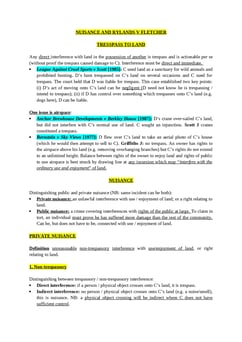Bradford Corporation v Pickles [1895] AC 587
Judgement for the case Bradford Corporation v Pickles
Table Of Contents
KEY POINTS
Tort law hinges on intent, where lawful actions can turn actionable if done with malice.
Property use is central, entwining with tort law, often leading to disputes like diverting water between lands, highlighting the interplay of personal rights and harm to others.
FACTS
The appellants pursued legal action to halt the respondent's tunnel excavation near East Many Wells in Bradford, expressing concerns that such activity could potentially diminish the water supply from these vital springs. Their assertion of rights under Acts of Parliament formed the crux of their legal argument.
Worth noting is that the appellants had secured the acquisition of water rights from the Bradford Waterworks Co. through the provisions of the Bradford Corporation Waterworks Act 1854.
On the opposing side, the respondent, who owned an adjoining farm, harbored intentions of mineral mining but harbored apprehensions about potential water interference, given the pivotal role of this water source in supplying the needs of Bradford.
Initially, Justice North granted an injunction favoring the appellants, but it is noteworthy that the Court of Appeal subsequently reversed this initial ruling, setting the stage for further legal deliberations in this complex matter.
JUDGEMENT
The judgment concluded that a landowner's actions remain lawful, even if driven by motives such as compelling an authority to buy water rights at their chosen price.
The legality of property use isn't affected by an improper or selfish motive as long as it is legal with a proper motive.
In this case, diverting percolating water on the landowner's property, affecting neighboring land used by a water authority, was not deemed illegal since the authority hadn't acquired rights to the water.
COMMENTARY
The appellants sought to stop the respondent's tunneling near East Many Wells in Bradford, fearing it could impact their water supply. They cited specific Acts of Parliament for support.
The appellants were allowed to buy water rights through the Bradford Corporation Waterworks Act 1854, underscoring the role of legal frameworks in managing water rights and land use.
The respondent planned mineral mining but was concerned about water supply disruption in Bradford, affecting various stakeholders. An injunction favored the appellants, raising questions about balancing property rights and motives.
The Court of Appeal's decision emphasized that lawful actions remain legal, even if motivated by compelling an authority to buy water rights at a specific price. This underscores that property use legality isn't necessarily affected by motives considered improper or selfish as long as the actions are legal with a proper motive.
Where diverting water on the landowner's property wasn't deemed illegal due to the water authority's lack of rights. Clear property rights and legal arrangements are important in resolving land use disputes. A nuanced legal approach is needed to consider landowners' rights and broader societal interests.
ORIGINAL ANALYSIS
Plaintiff’s dam was supplied by water originating in a spring on Defendant’s land.
Defendant had the water diverted (so as to make Plaintiff pay for it), rendering the dam useless.
HL held that Defendant was entitled to do so.
Lord Halsbury:
Motive is irrelevant.
If the motive is bad but the act is lawful (as here where Defendant had a right to divert the water) then it is not an actionable nuisance and vice versa.
-----
This seems to go against the exercise of the courts in balancing public and private interests, where here, Defendant has made no gain (he has no use of the water) at a massive social cost. Also the law is inconsistent on the question of motive.
In Christie v Davey, Plaintiff was awarded an injunction by the court to stop Defendant making foul noises in order to intimidate Plaintiff’s children when practicing musical instruments. North J said that due to their malicious motive they ought to be regarded as “excessive and unreasonable”, whereas if the noises had been made “legitimately” e.g. practicing an instrument as Plaintiffs had done, then he would have allowed them to continue.
How can they be reconciled?
Jolowicz explains it by saying that the right to make noise is relative and therefore circumstances, including motive, should be taken into account, whereas the right to percolate water is absolute.
Taggart claims that it was purely on the basis of right: water is something which my neighbours have no right to receive from my land.
Lunney and Oliphant say contradiction.
For Further Study on Bradford Corporation v Pickles
Need instant answers? Our AI exam tutor is here to help.
Ask questions 🙋 Get answers 📔 It's simple 👁️👄👁️
Our AI is educated by the highest scoring students across all subjects and schools. Join hundreds of your peers today.
Get StartedSimilar Cases
Related Product Samples
These product samples contain the same concepts we cover in this case.
| Tort Law | Nuisance Notes (70 pages) |
| Tort Law | Nuisance Notes (10 pages) |

